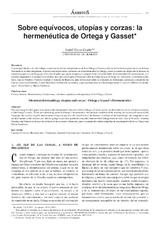Sobre equívocos, utopías y corzas: la hermenéutica de Ortega y Gasset
On misunderstandings, utopias and corzas : Ortega y Gasset´s Hermeneutics
Autor
Navas Ocaña, Isabel
Editor
Asociación de Estudios de Ciencias Sociales y HumanidadesFecha
2011Materia
Crítica literariaHermenéutica
Feminismos
Literatura española contemporánea
Ortega y Gasset, José, 1883-1955
Literary criticism
Hermeneutics
Feminisms
Spanish Contemporary Literature
METS:
Mostrar el registro METSPREMIS:
Mostrar el registro PREMISMetadatos
Mostrar el registro completo del ítemResumen
El principal objetivo de este trabajo es analizar las teorías interpretativas de José Ortega y Gasset y utilizar dichas teorías para hacer una lectura feminista de la obra orteguiana. Aspectos tan interesantes, presentes en la hermenéutica de Ortega, como la condición utópica de la lectura, la naturaleza equívoca del lenguaje, el residuo ilegible que queda siempre en cualquier texto, la inefabilidad, la historicidad del conocimiento, y el carácter imaginativo y creador de la ciencia, nos van a servir para reflexionar sobre la forma en la que Ortega lee, interpreta, a escritoras como Safo, Ana de Noailles, Victoria Ocampo y Simone de Beauvoir, para reflexionar sobre su concepto de feminidad, expresado a propósito de figuras como las de Salomé, Emma Hamilton y la Marcela cervantina, y para replantearnos la relación que mantuvo con dos célebres discípulas suyas: Rosa Chacel y María Zambrano. The main target of this paper is to analyse the interpretative theories of José Ortega y Gasset, and to use these theories to do a feminist reading of the Ortega’s works. There are interesting points in Ortega’s hermeneutics: the utopian condition of the reading, the equivocal nature of the language, the residuo ilegible that remains always in any text, the inefabilidad, the historic condition of the knowledge, the imaginative and creative nature of the science, etc. We are going to use these points to study the form in which Ortega reads to Safo, Ana de Noailles, Victoria Ocampo and Simone de Beauvoir, to think on his concept of feminity, and to examine the relationship that he maintained with Rosa Chacel and María Zambrano.

